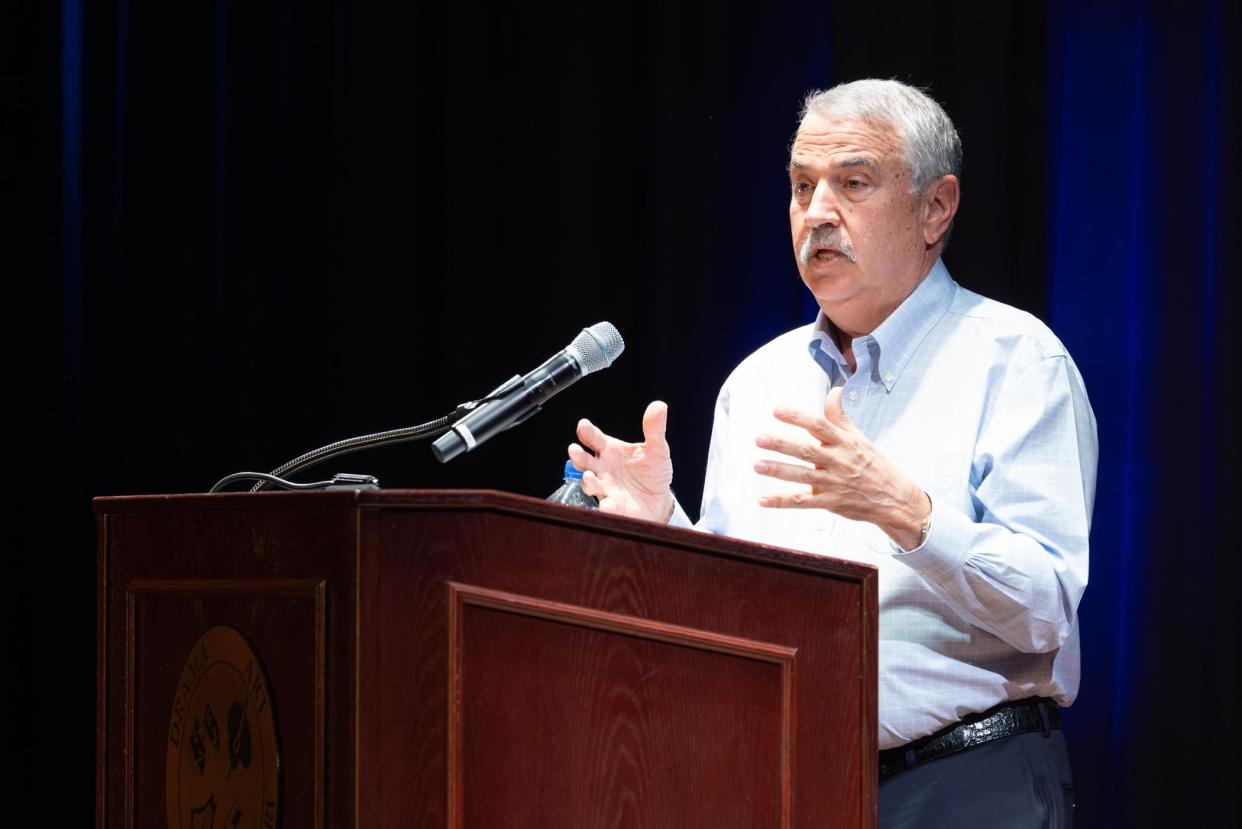NYT columnist Friedman speaks about global instability during Palm Beach lecture

- Oops!Something went wrong.Please try again later.
The world is facing an increasingly unstable era that threatens weak and strong countries alike, said three-time Pulitzer winner and New York Times columnist Thomas Friedman during a Tuesday lecture in Palm Beach.
“These changes are making it harder and harder to be a weak state, harder and harder to be a strong state; and super easy to be a failed state,” said Friedman during the Society of the Four Arts' Esther B. O’Keeffe Speaker Series lecture.
While a bulk of Friedman’s lecture pertained to the challenges unique to what he calls the “post-post-Cold War,” he reserved a portion of his Feb. 20 lecture to address what he said was the only sustainable solution to the Israel-Gaza war: a path to two states.
Friedman rose to prominence in the early 1980s for his coverage of the Lebanese Civil War and Israel’s subsequent invasion of Lebanon, which netted him the Pulitzer Prize for international reporting. In 1988, he won his second Pulitzer Prize for his coverage of the First Intifada, a Palestinian uprising in response to the continued Israeli military occupation of the West Bank and Gaza.
Friedman joined the New York Times opinion section in 1994, where he’d win his third Pulitzer Prize in 2002 for his commentary on the international impact of terrorism.
During his lecture, Friedman said that there are three main challenges facing nations in our current era, the first of which is the rise of multiple rival “superpowers,” as opposed to the Cold War’s bipolar rivalry between the U.S. and Soviet Union.
Moreover, he said recent history has seen the rise of “super-empowered people and small groups,” such as the deceased Al-Qaeda leader Osama Bin laden, or more recently, the Yemen-based Houthi militants. He also said that because the world has multiple rival powers who all exist within a connected economic system, “money flowing from the developed world to the developing world has shrunk dramatically.”
“That’s why during the Cold War, it was a great time to be a weak little country,” he said. “It was wonderful because there were these two superpowers competing for your affection.”
As an example, he pointed to China's takeover of the international textile market when it entered the World Trade Organization in 2001. “China now is in the World Trade Organization. So, nobody else can be in the textile business,” Friedman said.
According to Friedman, the developing world's lack of economic prosperity, combined with a population boom, led to a rise in people emigrating from the developing world to the developed world. He says this exasperates the developing world’s already dour economic outlook.

Further fueling instability is what Friedman calls the “technological supercycle,” a group of technologies that record and analyze data at unprecedented rates. “Everything from your Apple Watch ... to your F-35's (are) embedded with sensors that enable us to sense, digitize, process, learn, share and act, faster and faster,” he said.
Friedman says the technological revolution has been increasing the interconnection between people and between countries, in turn, creating a system where instability in any one location or “node” could have rippling effects.
“So now instability in one node in the system ... can show up in Palm Beach in three days, and sometimes three hours,” he said to the 580 people in attendance. “So, the whole system is fragile.”
Moreover, the "technological supercycle" is occurring all while civilization emits more carbon than at any other time in history, creating what he calls a "climate supercycle."
"We're in the middle of two supercycles now at the same time, and they're both going on faster and faster," he said. "And what they've done is explode every traditional political party in the world, all of which were designed for the Industrial Revolution."
Friedman says that the political dichotomy of left and right are not capable of adapting to the rapidly changing conditions of the current moment. He called this the approach that could challenge the far left and far right, which he accuses of "ripping apart the center where truth and trust have to work."
Since 2011, Friedman has been calling for a "radical centrist" movement, what he defines as a pragmatic, nonpartisan approach to politics. Multiple commentators on both sides of the aisles have critiqued Friedman's approach as impractical, and blind to the fundamental disagreements between opposing political factions on issues such as health care.
He also said the key to stabilizing the “post-post-Cold War” era rests in the hands of the world's democracies, namely the U.S. and European Union.
“The two greatest inventions of mankind — political inventions — are the United States of America and the European Union,” he said. “Do you realize how lucky we are to be the generation that lives in a world of two United States, and not just one?”
Friedman says the only sustainable future for Israel and Palestine is a two-state solution
Friedman also devoted a portion of his lecture addressing the Israel-Gaza war, sparked by Hamas' Oct. 7 cross-border attack that killed around 1,200 Israelis and saw a further 240 kidnapped, more than half of whom remain hostage.
Friedman believes Iran had some influence in aiding the Oct. 7 attack, which he says was done as a response to the U.S.-backed effort to normalize relations between Israel and Saudi Arabia.
Israel’s subsequent invasion of the Gaza Strip has killed more than 29,000 Palestinians, most of those women and children, according to the Health Ministry in Gaza, which does not distinguish between militants and civilians.
According to Friedman, Israel is currently "Losing on three fronts," including the international narrative. "Hamas attacked Israel and killed parents in front of kids, kids in front of parents, raped women; and Israel got called before the International Court of Justice," he said.
While he said Hamas has embedded itself within civilian populations with little care for the repercussions, that does not diminish the Israeli offensive's high civilian death toll. "Israel has killed a lot of Palestinians civilians in Gaza. Too many," he said.
The second front on which Israel is losing, Friedman said, is in planning for the postwar future. He cited Israeli Prime Minister Benjamin Netanyahu and his far-right cabinet's refusal to consider "any kind of Palestinian statehood."
Recently, the Israeli Knesset voted on a resolution backing Netanyahu's call against any international effort to unilaterally recognize a Palestinian state.
Finally, Israel faces the challenge of the Iranian "octopus" and its "tentacles," the militant groups funded by the Iran including Hamas, Lebanon-based Hezbollah, and the Yemen-based Houthi.
It's not the first time Friedman has used animal analogies to analyze the Middle East, as he landed in hot water earlier this month for a Jan. 1 column that used animal kingdom metaphors to explain the conflict. He has since acknowledged the dehumanizing language of the column.
Friedman concluded his lecture saying the only path to a sustainable peace for Israel and Palestine is to create a path for a two-state solution, with a future Palestinian state composed of East Jerusalem, the West Bank and Gaza.
However, he admits there are roadblocks on both sides impeding the possible solution. Namely, the lack of any popular political party willing to negotiate with Israel on the Palestinian side, and Netanyahu and his far-right regime on the Israeli side.
"Under the surface is a huge dialogue going on, among Palestinians on that (the territories leadership). Parallel to that there's going to have to be an Israeli election that brings to power an Israeli government that is ready to at least begin the process of moving towards the horizon — the two-state solution," said Friedman. "That's the only way out of this course."
Diego Diaz Lasa is a journalist at the Palm Beach Daily News, part of the USA TODAY Florida Network. You can reach him at dlasa@pbdailynews.com. Help support our journalism. Subscribe today.
This article originally appeared on Palm Beach Daily News: Columnist Friedman says world undergoing exceptionally perilous moment

